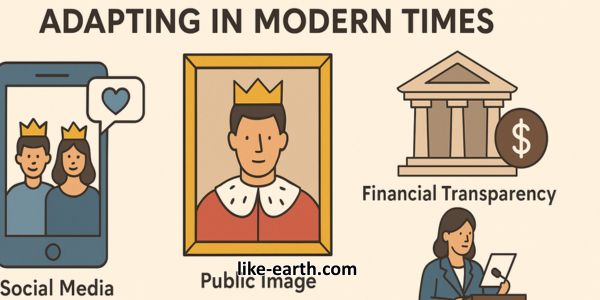How Monarchies Are Adapting in the Modern Age

How monarchies are adapting in modern times is a question that has gained relevance in an era marked by digital media, growing democratic expectations, and social transformation. As global societies progress, royal institutions—once symbols of absolute power—are navigating how to remain both traditional and relatable. How Monarchies Are Adapting
Tradition Versus Transformation
Historically, monarchies were seen as divine or authoritative powers. Today, these institutions are expected to represent unity and continuity without political influence. This requires balancing time-honored customs with evolving societal norms.
Royal families around the world—especially in constitutional monarchies like the UK, Sweden, and Japan—have transitioned into ceremonial roles. They engage in philanthropy, diplomacy, and cultural representation while remaining above political fray.
The Role of Digital Media
One of the most prominent shifts in royal adaptation is their increasing presence on social media platforms. Younger royals such as Prince William, Princess Catherine, and Princess Victoria of Sweden often use digital platforms to share initiatives, family moments, and official duties.
This digital presence humanizes royalty and allows the public to connect directly with institutions once seen as distant or rigid. It also opens royals to public scrutiny, demanding transparency and careful image management.
Public Accountability and Financial Transparency
Modern monarchies must justify their existence and funding. In the UK, the Sovereign Grant is audited and disclosed annually. Scandinavian monarchies publish detailed budgets. This transparency helps maintain public support and demonstrates responsible governance.
When controversies arise—such as spending scandals or personal behavior—modern monarchies often issue public apologies or adjust practices to reflect societal expectations.
Younger Royals Driving Change
The next generation is central to royal modernization. Royals like Prince William, Prince Haakon of Norway, and Japan’s Princess Aiko reflect values of gender equality, environmental concern, and mental health awareness.
By focusing on issues that resonate with youth, they ensure monarchy maintains cultural relevance and moral authority. These figures often attend international summits, launch awareness campaigns, and speak publicly on once-taboo topics.
Gender and Succession Laws
Several monarchies have revised succession laws to promote gender equality. Sweden and the Netherlands have enacted absolute primogeniture, allowing firstborn children, regardless of gender, to ascend the throne.
These changes align with modern democratic principles and challenge centuries of patriarchal tradition. They reflect how monarchies are evolving both structurally and ideologically.
Cultural Diplomacy and Global Outreach
Monarchs today serve as ambassadors of national culture and unity. They participate in state visits, international conferences, and humanitarian missions, helping boost national reputation and soft power.
This diplomatic function has become more vital as nations seek global influence through culture rather than conquest. The respectful presence of royals in foreign lands often softens political tensions.
Challenges to Relevance
Despite modernization, monarchies face criticism regarding inequality, privilege, and outdated customs. In some nations, republican movements advocate for the abolition of royal families altogether.
To survive, monarchies must constantly prove value, remain neutral, and avoid scandals. The margin for error has decreased significantly in today’s media-heavy environment.
Public Sentiment and Support
Support for monarchy varies by country. In the UK, the royal family continues to receive broad approval, especially among older generations. However, skepticism among youth has increased.
Meanwhile, monarchies like those in Japan and Morocco continue to hold spiritual and symbolic authority deeply embedded in cultural identity. Public trust is maintained through adherence to traditions and ceremonial dignity.
Adapting Ceremonies and Traditions
Many modern monarchies have adjusted ancient rituals to fit contemporary expectations. Coronations, state openings, and royal weddings are now televised globally and often simplified to reduce costs.
This ensures they remain relatable, accessible, and aligned with democratic ideals while preserving regal grandeur.
Education and Modern Values
Today’s royals are often highly educated. They attend universities, earn degrees, and pursue personal passions. This academic background helps them connect with educated constituents and convey competence beyond birthright.
Many royals also hold jobs or volunteer, breaking from tradition and showcasing a grounded approach to duty.
Conclusion: A Future Anchored in Adaptation
As long as monarchies reflect modern values, remain fiscally transparent, and engage with the public, they are likely to endure. The future of monarchy is not about resisting change, but embracing it strategically.
To explore more about global culture and societal transformation, visit our main site.
For real-time updates and conversation, join our official WhatsApp channel. How Monarchies Are Adapting



